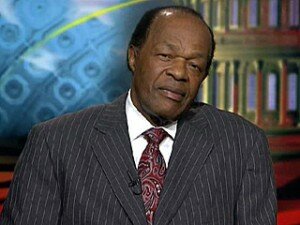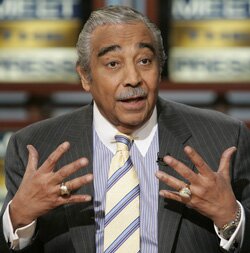Neither conspiracy nor post-racialism
African Americans, Featured — By G. Derek Musgrove on March 22, 2010 at 06:59In the first week of March, 2010, African American Governor of New York, David Patterson was forced to declare that he would not seek reelection amidst allegations that he improperly used the state police to silence a woman who had been abused by his aide; former Washington, DC Mayor, Marion Barry, now a City Councilman, was stripped of his Chairmanship for awarding a city contract to a woman with whom he was romantically involved; and Representative Charles Rangel (D-NY), the first African American Chairman of the powerful House Ways and Means Committee, was forced to step down amidst allegations of tax and travel violations.
In light of these developments, some Americans, particularly black Americans, are wondering if these things are a horrible coincidence or a sign of something more sinister. They are, perhaps, even more prone to do so because the majority of the open investigations before the House Ethics Committee target members of the Congressional Black Caucus (CBC). Aware of these suspicions, Joel Dreyfuss, editor of the Root published the article “The Perils of Black Power,” on March 3, 2010.
Dreyfuss wastes no time getting right to the question that is on many peoples’ minds. In the sub-title of his article, Dreyfuss asks if all of these investigations are the product of a “conspiracy” or evidence of “real power.”
He answers that they are the product of these black elected officials’ ethical lapses and the recent and unprecedented “acquisition of power by black Americans.” It is hard to disagree with this argument. There is no question that Barry and Patterson acted unethically, and that Rangel appears to have been negligent in the management of his office if not complicit in the misdeeds with which he is accused. Additionally nearly all of these men are powerful elected officials, and power invites scrutiny, particularly these days.
But Dreyfuss does not end there. He goes on to argue that blacks who fear that something more sinister than the normal workings of the justice system are at work in these cases, and specifically in the Rangel / CBC investigations, are “conspiracy theorists.” He bases this claim on the assumption that the United States has entered a “post-racial” era in which black elected officials are treated in a near identical manner to white elected officials.
Perhaps, but recent racial and political history tells a different story.
The determinative factor in the Rangel and CBC scandals that Dreyfuss fails to take into consideration is the racialized nature of contemporary partisan conflict. It is no secret to anyone that black elected officials are concentrated in the Democratic Party. All 43 members of the CBC, for instance, are Democrats. The House GOP has not hosted a black member since Representative J. C. Watts (R-OK) left the chamber in 2003. Though the GOP has become noticeably whiter in the last five years, this racial divide has been relatively constant since the mid-1960s.
During the same period, Republicans and Democrats have been locked in an electoral dead heat in which neither side has been able to establish a lasting governing coalition. Unable to beat each other at the polls, Republicans and Democrats have worked to frustrate the other party’s ability to govern. One of the principal weapons they have used in pursuit of this end is the ethics or official corruption investigation. Partisans and affiliated non-governmental groups have revealed damaging information about their opponents to the press, conducted or stimulated investigations, and then demanded prosecutions. This form of political warfare, which has its roots in the Watergate controversy, has been ably documented by political scientists Benjamin Ginsberg and Martin Shefter.[i]
These two developments, the racial division between the two major parties and the rise of political warfare, have had a distinct effect on black elected officials. A look at the CBC over the past thirty years illustrates my point.
During the 1980s and early 1990s, under the Administrations of Presidents Ronald Reagan and George H. W. Bush, one third of the members of the CBC were investigated by the Republican controlled Justice Department. Of these, only two were indicted and both were acquitted – a 0% indictment to conviction rate, roughly 80% below the average in official corruption cases at the time. Though the absolute number of white Democrats investigated and indicted by the Reagan / Bush Justice Departments in the 1980s was far higher than the number of blacks, black Democrats were five times more likely than their white counterparts to be investigated during this period.[ii] Hoping to take advantage of this string of investigations, the House GOP, lead by Representative Newt Gingrich (R-GA), attempted to make the issue of alleged Democratic corruption a pivotal issue in the 1988-94 elections.
During the Clinton years, Republicans did not have the Justice Department to attack the Democratic Party. Instead, they used the office of the Independent Counsel and Republican-controlled Congressional committees. Between 1992 and 2000, these bodies conducted investigations of three Clinton Administration cabinet officials, First Lady Hillary Rodham Clinton, and the President himself. These investigations exhibited the same racial imbalance as DOJ investigations of Congress in the Reagan / Bush years. Of the three cabinet officials investigated by the Independent Counsels, two were black and one was Latino. In the 1998 mid-term elections, the GOP ran against the alleged moral and political corruption of the Clinton Administration.
Today, this same pattern is at work. Conservatives and Republicans, however, are without the Justice Department, the Independent Council, or the House Judiciary Committee. Out of power on the federal level since 2006, they have been forced to use the newly created Office of Congressional Ethics, which refers allegations of ethics violations to the House Ethics Committee. In 2008, the National Legal and Policy Center, a self-described “conservative watch-dog organization,” which has a penchant for investigating liberal Democrats and ignoring the ethically questionable actions of conservative Republicans, filed the initial claim in five of the seven ethics investigations of CBC members now before the Ethics Committee.
In 2009, the Landmark Legal Foundation, an anti-labor, conservative legal group, asked the Ethics Committee to investigate chairman of the House Judiciary Committee John Conyers (D-MI). In the past two years, Republican Representative John Carter (R-TX) has introduced, and a majority of House Republicans have supported, four different resolutions calling on the House Democratic leadership to oust Representative Rangel from his committee chairmanship. And it appears that Rangel’s decision to step down earlier this month was influenced by information, released the day before he made his announcement, that Republicans had enough Democratic support to finally pass Carter’s resolution.[iii] It should come as no surprise, then, that as we gear up for the 2010 mid-term elections, Republicans are testing the corruption issue on talk shows and blogs.
In the midst of this latest round of racially skewed Republican attacks on the Democratic Party, members of the CBC have voiced the concern that they are being unfairly targeted for Ethics Committee investigations. Dreyfuss quotes (from the November 3, 2009 issue of Politico) one unnamed member of the CBC as saying, “there is somebody out there who understands what the rules [are] and sends names to the ethics committee with the goal of going after the [CBC].” (More recently, radio personality Tavis Smiley has stated that “we see black folk high up in office being run [out], from Charlie Rangel to pressure on Governor David Patterson.”[iv])
Dreyfuss dismisses this claim as “conspiracy theory.” Yet it is clear that a single conservative foundation did, in fact, file a majority of the complaints, and other conservative groups and Republican elected officials filed the others. In other words, Dreyfuss dismisses the above, accurate description of what was happening to the CBC as conspiracism.
I say all of this to make two points. First, U.S. politics are by no means post-racial. Whether it is running ballot integrity programs against black Democratic voters, filing ethics investigations against black Democratic elected officials, calling health reform “reparations,” or asserting that President Barack Obama harbors “a deep-seated hatred of white people,” Republicans and their allies in the conservative movement regularly press the battle against the Democratic Party by attacking black voters, black elected officials, and policies favored by blacks. Second, black political pundits’ uncritical embrace of post-racialism can blind them to some of the most powerful forces shaping American politics today.
Yeah, Marion Barry is unethical, David Patterson should be ashamed of himself, and Charlie Rangel knows better, but that does not mean that race no longer plays a critical role in U.S. politics. Quite the contrary.
[i] Benjamin Ginsberg and Martin Shefter, Politics by Other Means: Politicians, Prosecutors and the Press from Watergate to Whitewater (New York: W.W. Norton Co., 1999).
[ii] “Black Officials: Probes and Prejudice; Is there a Double Standard for Bringing Indictments,” Washington Post, February 28, 1988.
[iii] “Conservative Group Calls For Probe Of Conyers,” Washington Post, July 17, 2009; “Democrats Hold Off GOP Attack On Rangel,” Washington Post, October 8, 2009; “Rangel, under fire, leaves power post,” Washington Post, March 4, 2010.
[iv] “The Root Interview: Why Tavis Smiley ‘Cannot Be Silent.’” the Root, March 18, 2010.
Tags: African American, Barack Obama, Charles Rangel, David Patterson, Democrats, Marion Barry, Politics, post-racialism, racial, Talking about RaceAuthor: G. Derek Musgrove (1 Articles)

Dr. Musgrove is an Assistant Professor of History at UDC. Prior to Arriving at UDC, he was a visiting lecturer in the Department of History at Trinity College in Hartford, Connecticut. He received his Ph.D. in U.S. History from New York University in 2005.






 Share This
Share This Tweet This
Tweet This Digg This
Digg This Save to delicious
Save to delicious Stumble it
Stumble it





 Public Transportation Pt. 1
Public Transportation Pt. 1 Afghanistan: What happens when our allies 'do more'
Afghanistan: What happens when our allies 'do more'







